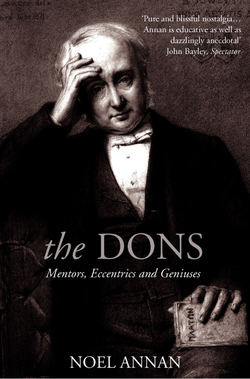The Dons: Mentors, Eccentrics and Geniuses

Реклама. ООО «ЛитРес», ИНН: 7719571260.
Оглавление
Noel Annan. The Dons: Mentors, Eccentrics and Geniuses
The Dons. Mentors, Eccentrics and Geniuses. NOEL ANNAN
COPYRIGHT
DEDICATION
CONTENTS
INTRODUCTION
CHAPTER ONE The Dons Create an Intellectual Aristocracy
CHAPTER TWO The Genesis of the Modern Don – William Buckland
CHAPTER THREE The Charismatic Don – John Henry Newman
CHAPTER FOUR Benjamin Jowett and the Balliol Tradition
CHAPTER FIVE The Don as Scholar – Frederic Maitland
CHAPTER SIX The Pastoral Don – The Ethos of King’s
CHAPTER SEVEN The Trinity Scientists – J. J. and Rutherford
CHAPTER EIGHT The Don as Wit – Maurice Bowra
CHAPTER NINE The Don as Performer – George Rylands
CHAPTER TEN The Don as Dilettante – John Sparrow
CHAPTER ELEVEN The Don as Magus – Isaiah Berlin
CHAPTER TWELVE Women Dons in Cambridge
CHAPTER THIRTEEN The Don as Administrator
CHAPTER FOURTEEN ‘Down with Dons’
ANNEXE The Intellectual Aristocracy
INDEX
ACKNOWLEDGEMENTS
ABOUT THE AUTHOR. The Dons
ABOUT THE PUBLISHER
Отрывок из книги
To Francis Haskell
Title Page
.....
Their good manners appeared in their prose. At its worst it was lucid and free from scholarly jargon. They wrote with a sense of form, of drama, of the possibilities of language; and they wrote not for a scholarly clique but for the intelligent public at large whom they addressed confident that they would be understood. Moreover, their scholarly manners had an ease seldom evident in a parochial professoriate. They declined, with a few exceptions, to follow the pulverising style of German professors. Darwin and Maitland showed that it was possible to argue without breaking heads, and even such controversialists as Huxley were untainted by the odium clericum and distinguished between the charlatan and the wrong-headed. They valued independence and recognised it in others. Because they judged people by an exterior standard of moral and intellectual merit, they never became an exclusive clique and welcomed the penniless son of a dissenting minister as a son-in-law if they believed in his integrity and ability. Because their own proud standards were assured they tolerated a wide variety of belief. They might follow the French sociologist Auguste Comte, they were often followers of Mill, they might be agnostics, or they might continue to adhere to the Church of their fathers; but they respected each other’s beliefs, however deeply convinced that the beliefs were wrong. They were agreed on one characteristic doctrine: that the world could be improved by analysing the needs of society and calculating the possible course of its development.
They could be intimidating to meet. Intellectuals often are. Their sense of responsibility to reason was too great for them to appreciate spontaneous behaviour. Spontaneity is attractive, but its lack of rational consideration irritated them. They were bored by the superficiality of drawing-room gossip, and preferred to have their talk out rather than converse. As infants they had learnt by listening to their parents to extend their vocabulary and talk in grammatical sentences – of which the best known (to an enquiry after his toothache) was the four-year-old Macaulay’s ‘Thank you, madam, the agony is abated.’ When older they subconsciously apprehended from hearing discussions between their elders how to reason logically. They lived in houses in which books were part of existence and the intellect was prized. They developed inner resources for entertaining themselves which did not depend on the ordinary social accomplishments. Competitive examinations at the schools and universities sharpened their minds. Children who did not inherit their parents’ intellectual talents suffered unjustly by feeling that they had failed; children were expected to marry according to their parents’ lights. One who was on the point of marrying an actor was safely brought back to the fold to marry a don. The dedicated agnostic G. M. Trevelyan bore his daughter’s marriage to a scholarly clergyman like a man. But there were limits, and he told his son: ‘I want you to know that your mother and I wish you to be free to marry whom you will. But we will take it hard if she is a Roman Catholic.’
.....